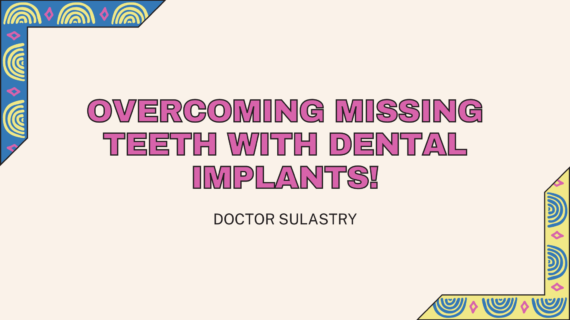Overcoming Missing Teeth – Having toothless teeth makes many people insecure. Luckily, now there are many types of dentures that you can choose to restore your beautiful face. One of them is dental implant procedure.
Dental implants are included in the type of permanent dentures. This means that once installed, this tool cannot be removed, except through a special procedure by a dentist. For many people, dental implants are often an option. Because aesthetically, dental implants are very similar to natural teeth. If you want to overcoming missing teeth, you can try to use this dental implants.
Also Read Teeth Whitening Facts and Benefits That Should You Know
More about dental implants
Dental implants are screw-like devices made of metal. Implants are implanted in the jawbone through a minor surgical procedure to replace missing teeth.
Over time, new bone and tissue will grow around the implant that has been implanted, so that the implant will be firmly embedded. On top of the implant, the doctor will then place a denture that fits, in terms of size, shape, and color, with the other teeth in the user’s mouth. Dental implants can also be used as a support for bridge dentures or complete dentures.
Why is a dental implant procedure necessary?
Dental implants can be used to replace part or all of a missing tooth. The purpose of tooth replacement is to restore the function and aesthetics of the teeth. When compared to other types of removable dentures and dental bridges, dental implants have quite prominent advantages. This is because dental implants can melt into the bone structure so that they are very stable and have the appearance and feel of real teeth.
What are the advantages of dental implants?
- Improve speaking skills. Most dentures do not fit properly, which can interfere with your speech. But this dental implant procedure will allow you to speak in a relaxed manner without worrying about your teeth slipping.
- You Will Feel more comfortable. Dental implants are claimed to be much more comfortable to use than dentures.
- Can Eat easier. Dentures that can shift can make it difficult to chew. Dental implants act like your own teeth and allow you to eat more comfortably and painlessly.
- Also Increase self-confidence. There is no need to be ashamed if you want to smile or laugh, because this method is able to replace missing teeth perfectly.
- Maintain oral health. In contrast to dentures, which when installed must remove the surrounding teeth. Having a dental implant does not require you to extract another tooth.
- The Durability. Implants can last a long time and be used for years. With good care, many implants can last a lifetime.
Who can get dental implants?
Anyone healthy enough to undergo routine tooth extraction or oral surgery may consider having this procedure done.
The patient must have healthy gums and bone that is strong enough to hold the implant. You also have to be diligent in maintaining good oral hygiene and making regular visits to the dentist.
Heavy smokers, people with chronic diseases, such as diabetes or heart disease, patients who have had radiation therapy to the head or neck area need to be evaluated before implanting.
If you are considering having implants, talk to your dentist to see if this is the right way for you.
Stages of installing dental implants
The procedure for placing dental implants is not a short process. The series of processes, from implanting implants to placing dentures on them, can take months as it is necessary to wait for tissue and bone to grow around the implants.
- Install dental implants. To place a dental implant, the doctor will make an opening in the gum that was previously a toothless area, so that the jawbone can be seen. The jawbone will then be buried, as a place for the implant to be placed.
This dental implant will later act as the root of the tooth, so it will be implanted deep enough in the jawbone. After the implant is implanted, the gums will be closed again by means of stitches. At this first stage, your teeth will still look toothless.
- Waiting for bone growth. After the dental implant is properly embedded in the bone, the process of integration or union between the implant and the surrounding tissue will begin. During this process, the jawbone grows and fuses with the surface of the dental implants. This process can take months to complete.
- Installation of denture bases (abutments). After the integration process between bone and dental implants is complete, the doctor will carry out the next process, namely the installation of denture bases. This installation will also require minimal network opening or minor surgery. To attach the base of the denture, the doctor will make a small incision in the gum so that this part can attach well to the dental implant. After the denture base is complete, the doctor will sew the gums back together so they can close properly.
- Installation of denture bases (abutments). After the integration process between bone and dental implants is complete, the doctor will carry out the next process, namely the installation of denture bases. This installation will also require minimal network opening or minor surgery.
To attach the base of the denture, the doctor will make a small incision in the gum so that this part can attach well to the dental implant. After the denture base is complete, the doctor will sew the gums back together so they can close properly.
Risks of dental implants
As with other medical procedures, dental implants also have some possible risks, such as:
- Bacterial infection in the implanted gum tissue and inflammation in the area
- Requires a more complicated procedure, such as a jawbone graft, especially if the jawbone is judged to be weak
- In terms of cost, dental implants are more expensive than other types of dentures





